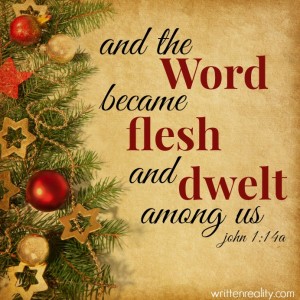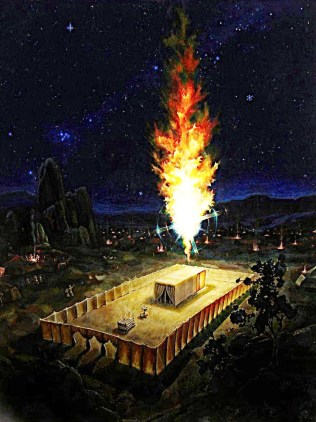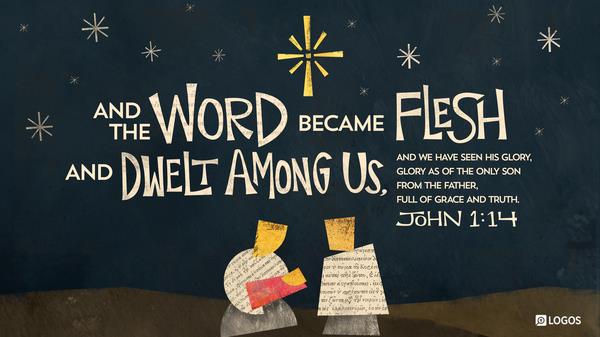“The Word Became Flesh and Tabernacled among Us” (John 1:1-18)
 “And the Word became flesh and dwelt among us, and we have seen his glory, glory as of the only Son from the Father, full of grace and truth.” This verse, John 1:14, is one of the most profound sentences ever written. Because it expresses and puts into words one of the most profound mysteries that has ever occurred in human history: that the eternal Son of God, through whom all things were created, at a certain point in time took on human flesh, became our brother, and that this is the greatest gift you or I will ever receive. This is the miracle of Christmas. God dwelt among us. And so our theme this morning on this glorious Christmas Day: “The Word Became Flesh and Tabernacled among Us.”
“And the Word became flesh and dwelt among us, and we have seen his glory, glory as of the only Son from the Father, full of grace and truth.” This verse, John 1:14, is one of the most profound sentences ever written. Because it expresses and puts into words one of the most profound mysteries that has ever occurred in human history: that the eternal Son of God, through whom all things were created, at a certain point in time took on human flesh, became our brother, and that this is the greatest gift you or I will ever receive. This is the miracle of Christmas. God dwelt among us. And so our theme this morning on this glorious Christmas Day: “The Word Became Flesh and Tabernacled among Us.”
“Wait a minute, Pastor! I thought the verse says, ‘The Word became flesh and ‘dwelt’ among us? Where are you getting this ‘tabernacled’ from?” Well, hold on, we’ll get there, don’t worry. ‘Dwelt,’ ‘tabernacled,’ same same. As you will see.
But first, let’s take the first part of this verse: “And the Word became flesh.” What is this talking about? Or should I say, Who is this talking about? For the Word is a person. That’s right, the one here called “the Word” is a person, none other than our Lord and Savior Jesus Christ, the Second Person of the Trinity. Here in John 1, right in the very first verse, he has been identified as “the Word”: “In the beginning was the Word, and the Word was with God, and the Word was God. He was in the beginning with God. All things were made through him, and without him was not any thing made that was made.”
John is going back to the beginning here. He’s consciously imitating the language of Genesis 1, “In the beginning God created the heavens and the earth.” John is saying that the Word was there in the beginning, active and involved in the act of creation. And that this one called the Word was equal to God, divine in his nature, while at the same time a distinct person, in a face-to-face relationship with God. There was never a time when he was not, and all things came into being through him, through this one called the Word.
This is mind-blowing, this is mind-boggling, but this is the mystery of the Holy Trinity. One God, yet three distinct persons, Father, Son, and Holy Ghost. And “the Word” here is referring to the Son, the eternal Son of God, with God the Father from eternity, the agent of creation. By and through this “Word,” this Logos, the whole universe holds together. He who put the planets into place and keeps them spinning around . . . the one who called forth stars and seas, and mountains and hills . . . the one who made all creatures who live upon the earth–birds, and fish, and four-legged creatures, and, yes, us two-legged creatures also, man and woman, and all of us ever since . . . this is the one here called “the Word.”
 And even more amazing and mind-blowing and mind-boggling than it is to ponder the God of creation and the mystery of the Trinity–more amazing than that is the news that the eternal Son of God took on human flesh. “And the Word became flesh.” This is the mystery of the Incarnation. God became incarnate, that is, came in the flesh. Conceived by the Holy Spirit, born of the virgin Mary, and now lying in a manger, this child is the one who created all people and all things that have ever been created. Can there be anything more profound than that?
And even more amazing and mind-blowing and mind-boggling than it is to ponder the God of creation and the mystery of the Trinity–more amazing than that is the news that the eternal Son of God took on human flesh. “And the Word became flesh.” This is the mystery of the Incarnation. God became incarnate, that is, came in the flesh. Conceived by the Holy Spirit, born of the virgin Mary, and now lying in a manger, this child is the one who created all people and all things that have ever been created. Can there be anything more profound than that?
And the humbleness of it all! A little baby, in a little town, and lying in–not in a soft feather bed in a king’s palace, but rather in a lowly manger, an animal’s feed trough, because they couldn’t even find a hotel room to have the baby born in! God incarnate, lying in a manger. The creator of the universe, coming in the flesh in such low estate.
And coming as our greatest treasure, the greatest blessing you and I will ever have. It’s like this: Someone gives you for your Christmas present the most beautiful and most costly jewel in the world, but it comes wrapped in a plain brown paper wrapper. And so here is the Son of God, coming to save you, and he comes wrapped in swaddling clothes and lying in a manger.
 But did I say this is a gift? Yes, the Word becoming flesh is a gift, the greatest Christmas present you will ever receive. For he comes not to search you out and terrorize you or condemn you. No, he comes to seek and to save you! To give you life in place of death. To give you a future and a hope and blessed consolation. Not despair or doom or condemnation. But hope and joy and consolation. Comfort and joy, peace and forgiveness, all wrapped up into one.
But did I say this is a gift? Yes, the Word becoming flesh is a gift, the greatest Christmas present you will ever receive. For he comes not to search you out and terrorize you or condemn you. No, he comes to seek and to save you! To give you life in place of death. To give you a future and a hope and blessed consolation. Not despair or doom or condemnation. But hope and joy and consolation. Comfort and joy, peace and forgiveness, all wrapped up into one.
You’ll find the present under the tree–actually, on the tree, on the tree of the cross. For that is where this baby is headed: From lying in a lowly manger, to hanging on a cruel cross, to lying lifeless in a cold tomb, Jesus Christ goes the distance for you. That is why he came in the flesh, to do all that for you. It is your sins for which he died. It is your death he suffered. But by doing so, the holy Son of God purchased redemption for you, setting you free from all that bound you, forgiving your sins, winning your salvation. No greater Christmas present will you ever receive, for this gift has it all: forgiveness, life, and eternal salvation, resurrection life that conquers the grave and lasts forever.
This all-inclusive gift, this all-surpassing gift, is delivered to you in the gospel. Again, quite humble and ordinary-looking. Not impressive at all. A man preaching a sermon to you. You eating and drinking some bread and some wine, but connected with these words: “This is my body, this is my blood, given and shed for you for the forgiveness of sins.” Lowly means, holy words, powerful life-giving gift. God gives his gospel gifts much like he sent the Savior: not much to look at, but glorious gifts hidden in humble wrapping.
 Which brings us to the “tabernacled” part. I said earlier that the verse, “And the Word became flesh and dwelt among us,” could also be translated, “And the Word tabernacled among us.” That is so, and now I’ll explain. The word in our text that says “dwelt” is the same word that is used in the Bible to refer to the tabernacle, the Old Testament tabernacle, as the dwelling place of God.
Which brings us to the “tabernacled” part. I said earlier that the verse, “And the Word became flesh and dwelt among us,” could also be translated, “And the Word tabernacled among us.” That is so, and now I’ll explain. The word in our text that says “dwelt” is the same word that is used in the Bible to refer to the tabernacle, the Old Testament tabernacle, as the dwelling place of God.
In the Old Testament, the Lord God dwelt in the midst of his people Israel at the tabernacle. The tabernacle was a tent, a big tent that the Israelites were told to take with them on their journey to the Promised Land. The tabernacle was the holy place where the Lord dwelt to be present with his people, to guard and guide them, to forgive their sins, to hear their prayers, and to manifest his presence and his glory–to reassure them and give them confidence to go forward. The tabernacle was the place where sacrifices and offerings were made, to atone for sin and to remove guilt and uncleanness.
Well, all that the tabernacle delivered, all that the Old Testament tabernacle foreshadowed–all of that now is fulfilled and delivered in an even greater way in the incarnation of our Lord Jesus Christ. He is the presence of God in our midst. He is Immanuel, “God with us.” He is the all-atoning, all-availing sacrifice for our sins. Our guilt and our uncleanness are removed and washed away by the blood of the Lamb–Christ, the Lamb of God who takes away the sin of the world.
“And the Word became flesh and tabernacled among us.” And Jesus says, “Where two or three are gathered together in my name, there am I in their midst.” Our risen Lord assures us, “And lo, I am with you always–all the days, every day–to the very end of the age.” Jesus is our tabernacle, God present in our midst to serve and save us. Good news! The greatest of news! Christmas joy and peace! The greatest Christmas present is Christ present in our midst.
John 1:14 concludes, “And we have seen his glory, glory as of the only Son from the Father, full of grace and truth.” The apostle John could say that literally. He saw with his own eyes the Son of God in the flesh. John saw the glory of Christ manifest in the Transfiguration. And John also saw Christ glorified in the most mysterious way, when he saw Jesus lifted up on the cross. God’s glory is shown chiefly in showing mercy, and Christ crucified in the most glorious mercy of all. And then John saw Christ’s glory when the Lord stood among them, having risen from the dead. So John saw his glory with his own eyes. For now, you and I, we see with the eyes of faith, the Holy Spirit working faith in us through the gospel proclaimed. But one day we too will see our Lord face to face, and what a glorious day that will be!
The miracle of Christmas! The mystery of the Incarnation! And the hope of glory to come! “And the Word became flesh and dwelt–tabernacled–among us, and we have seen his glory, glory as of the only Son from the Father, full of grace and truth.”
